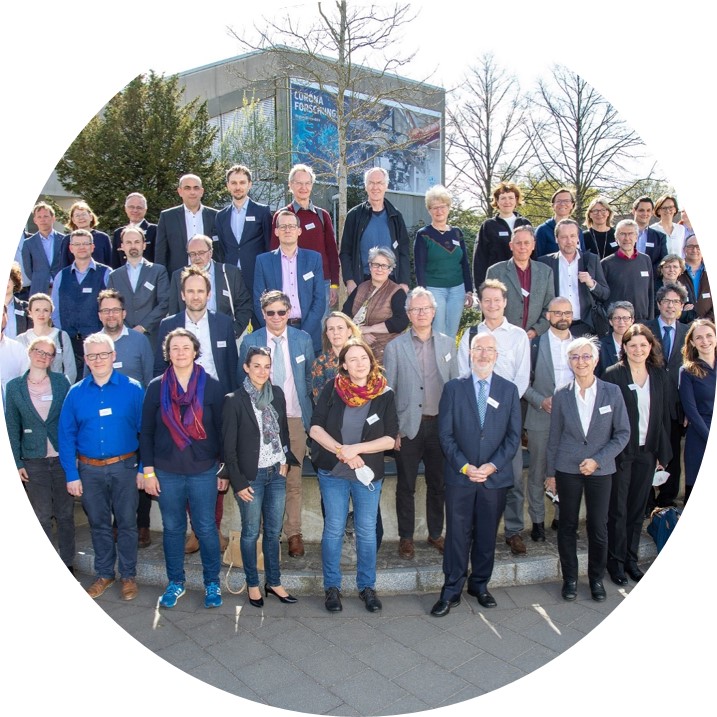During the introduction to the one-day event for the KEFs, which was held in cooperation with the German Electron Synchrotron (DESY) on 25 April 2022 at its premises in Hamburg, Helmut Dosch, Chairman of the DESY Directorate, explained that DESY had committed itself to peaceful purposes in its guidelines for research. In recent years, research cooperation with foreign partners, especially with China, had received increased attention. The DESY Commission for Ethics in Research offered advice in the field of tension between scientific freedom, ethical values and legal rights.
The chairs of the Joint Committee gave further introductions to the topics of the day and presented the initial results of the Joint Committee’s survey, which was intended to record the activities of the KEFs and, in particular, security-relevant research projects that were being deliberated on in 2020/21. There continued to be relatively few security-relevant cases at the research institutions that give cause for concern. However, in many cases there was still a lack of awareness among researchers when it came to recognising possible risks and contacting the responsible KEF if necessary. At the same time, KEFs should present themselves more proactively as contact points for ethical research issues.
A representative of the DLR Institute for the Protection of Maritime Infrastructures presented the ELSA research (ELSA = Ethical, Legal and Social Aspects) at the DLR. This initially ensured integrated accompanying research, prepared legal and ethical opinions and trained or sensitised staff. In addition, ELSA research involved relevant expert groups at an early stage. Finally, the development of methods for ethical accompanying research was also planned in order to enable ethically secured cooperation and interdisciplinary networking. Topics such as “trustworthy AI”, neuroethics, autonomous systems, learning systems, etc. would be addressed in particular. In parallel, the DLR was currently setting up a KEF. Ethical accompanying research was sometimes also carried out on behalf of industry partners in return for appropriate financial compensation. The consultation and documentation procedure of the planned KEF had already been developed. The increasing awareness of researchers would be decisive for the utilisation of the KEF.
The chairperson of the KEF at DESY explained the composition of the panel and a guideline for submitting proposals to the KEF. In addition to security-relevant cases, an animal experiment at DESY was also deliberated by the KEF. The KEF always asked in advance whether formal and legal questions had been clarified. In one case involving the acquisition of research-related material from a company with a non-civilian division, it had also played a role whether the material was also available from another civilian-oriented company and whether only a certain device would be used. The KEF had ultimately recommended that legal advice be sought regarding the necessary contractual clauses. The main goals of the KEF were to offer advice to researchers and to sensitise them to security-relevant issues in a culture of exchange and communication.
Representatives of the Karlsruhe Institute of Technology (KIT) reported on the consultation on a project from automated image evaluation, in which moving images were to be selected with the help of eye movements and EEG. The purpose of the project was stated as supporting paralysed people. Since the researcher was also connected to military lobby organisations, the committee remained concerned that the expected research results could also be used for military purposes, such as to control combat drones, even though this could not be proven. The KEF of the KIT had wished to be updated about results and areas of application midway through the project. Another case for consultation involved the development of secure cloud solutions for infrastructures, including the identification of possible security gaps. At the same time, the results were to allow state security agents to track down information on the respective hackers in the case of serious crimes. Because of this obvious dual use, a high degree of transparency and early ethical consultation had been crucial.
The chair of the KEF of the Research Centre Jülich, founded in 2021, reported on a project on hydrogen technologies in the field of basic research involving an industrial partner with military activities. An important question for the KEF was whether the technology is also suitable for mobile military vehicles. Questions of transparency and publications were also clarified. As a consequence, the Research Centre Jülich had developed a self-assessment guide for researchers. The majority of the enquiries were aimed at finding the right contact person. On the question of whether the classification of a project as basic or applied research is decisive for its ethical evaluation, there was still too little experience available. Gain-of-function experiments on viruses were definitely security-relevant, although they were mostly assigned to basic research. The exchange with the export control officer and the international department at the Research Centre Jülich was also important. A civil clause in the shareholder agreement of the Research Centre Jülich had also been reviewed by the KEF.
Cyra Ossenkopp from BAFA reported on BAFA’s initiative on export control in academic research. Scientific freedom did not exempt researchers from export control obligations. The potential for misuse of the respective research was the only decisive factor, regardless of the noble goals of researchers. Export control was currently gaining importance due to the global armament. BAFA’s manual “Export Control and Academia” was being revised in light of the EU’s new Dual-Use Regulation, supplemented with further practical examples and to be published in due course. In addition, BAFA wanted to engage with the advisory needs of research institutions and universities at its on-site road show. When asked about differentiating between tangible and intangible transfer of goods in practice, Ossenkopp replied that there remained a considerable need to raise awareness among researchers, for example about the fact that even sending emails could constitute an export of technology. This was also true for other EU member states. Therefore, corresponding awareness-raising measures would also be carried out at EU level.
A member of the DFG Head Office presented the DFG’s multi-stage proposal process. With 20,000 proposals in 2021, there had been only a handful of research papers in which an immediate risk of misuse had to be evaluated. This would not be a direct reason for rejecting DFG proposals, but measures to minimise risk, KEF advisory votes and the assessment of reviewers would be explicitly requested. The decision for or against funding was always made by the DFG’s Joint Committee (Hauptausschuss). On the question of what risk-minimising measures could look like, she explained that, for example, publications could be made at a later date after a detailed assessment of risks, a different research strategy could be pursued or a cooperation agreement could be concluded to minimise risks. The Proposal Preparation Instructions suggested clarifying export control issues independently in advance, for example with the local export control officers or BAFA. The DFG did not provide this kind of clarification.
The closing discussion focused on whether the research funding of the EU or the BMBF also demanded ethics approvals. An “Ethical Self-Assessment” was required in the Horizon Europe funding programme, but this was not the case for BMBF projects, although the BMBF required a voluntary commitment to follow the “DFG Guidelines for Safeguarding Good Research Practice”, which addressed this issue. Meanwhile, ethics approvals were sometimes required for publication in journals. The panel suggested finding stronger differentiation criteria between DURC and military research. Instead of exerting pressure on researchers, more emphasis should be placed on advice. Compliance with the ELSA principles could play an important role in funding decisions. In addition, the conference participants spoke out in favour of anchoring the ethics of security-relevant research more firmly in education and teaching in the future. The German Rectors’ Conference, for example, could be involved in this.
Forum for the Committees for Ethics in Security-Relevant Research


